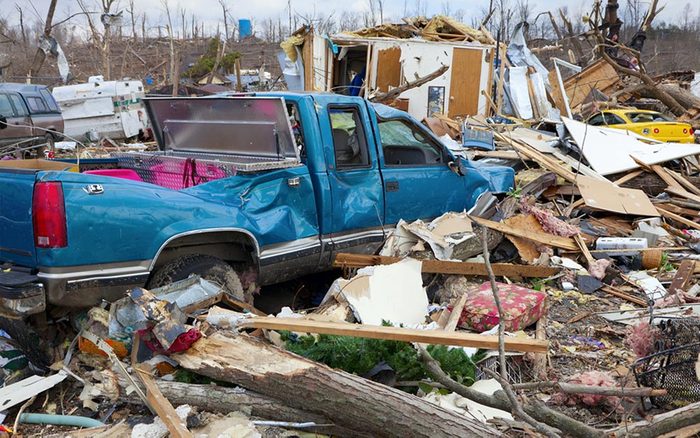4 Major Scams to Watch Out for in the Wake of Natural Disasters—and How to Avoid Them
Updated: Nov. 07, 2022

As awful as it seems, there are people who take advantage of natural crises. Whether you've been affected or are trying to help those who were, make sure you don't fall victim to a scam.
Whenever a natural disaster strikes, there are always many affected individuals who need help—and the majority of people genuinely want to provide it. But unfortunately, both disaster victims and would-be givers alike do have to be careful of predatory scammers. Here are the four most common ways people try to profit from crises like hurricanes and tropical storms—and how you can avoid them. Don’t forget to brush up on the best ways to prepare your home for a hurricane.
Fake rental listings
If you’re a storm victim, make sure you don’t also become a victim of a scam. Many people whose homes were damaged by the storm will be searching for new places to live, whether temporary or not. If you’re looking for new housing after a disaster, keep these tips in mind.
- Make sure you’ve seen the place you’re renting. Before you hand over any money, make sure that you’ve seen the place—and not just on the Internet. As tempting and convenient as it might seem to hand over a deposit, hold off until you know the renter is trustworthy.
- Make sure you’ve seen the person you’re renting from. Again, seeing is believing. Knowing that you’re renting from a real person is definitely a good sign that you’re not being scammed.
- Don’t provide important information over the Internet. Don’t disclose your bank account information or credit card number over the phone or the Internet, and definitely don’t wire money.
Fake contractors
Many storm victims haven’t lost their homes completely, but merely need repairs. Enter fraudulent contractors, hoping to take your money without doing any real work.
- Get a recommendation. Your best bet for avoiding scams would be to choose a contractor that either you know and trust, or that someone you trust has used before.
- Check for a license. Though licensing works differently in every state, a contractor who has a professional license is definitely a good sign. Ask for proof of insurance, too, so that you’re not penalized for any contracting accidents.
- Watch out for a FEMA”endorsement.” This is where it gets really tricky. An “endorsement” sounds totally scam-free, but don’t let this fool you. The Federal Emergency Management Agency (FEMA) does not certify contractors.
- Don’t pay up front. Any contractor who asks for full payment before any work is done is a major red flag. Don’t hand over all of the money immediately; a shady scammer will take it and run.
Find out which U.S. states are the most prone to natural disasters.
Fake charities
While not the most damaging of the scams, this is probably the most common: shady people or websites presenting themselves as well-meaning aid organizations.
- Speak up. If a charity organization reaches out to you, don’t be afraid to get in touch with the organization and ask for more details, including the organization’s address. If an organization seemed to suddenly appear out of the blue after a disaster, that’s a major clue that its intentions aren’t good.
- Don’t send cash. Though you shouldn’t give your credit card number to a non-verified organization, paying with a credit card is overall a more foolproof way to make sure your donation reaches people in need. Cash is far too easily misplaced or stolen.
- A charity by any other name… If a “charity”‘s name is similar to the name of a legitimate organization, it’s probably more likely to trick people. Again, call the organization and get details before you send anything.
- Donate to verified organizations. Despite all this, you definitely shouldn’t let a potential scam stop you from donating altogether. Check out the National Association of State Charity Officials, where you can find the names of legitimate relief organizations in your state. Here’s a list of the most impactful ways to help after a natural disaster.
Clickbait
While, by far, the least harmful of all of the scams, fake news stories and photos are definitely worth mentioning since they’re far too common in today’s digital age. In this case, seeing is not believing. Remember the viral photoshopped pic of a shark supposedly swimming along a Houston highway in the wake of Hurricane Harvey? While not a scam, this is just people grabbing for attention in the wake of a disaster, and you should try to avoid giving them that attention.
[Sources: LifeHacker.com, Consumerist.com]
